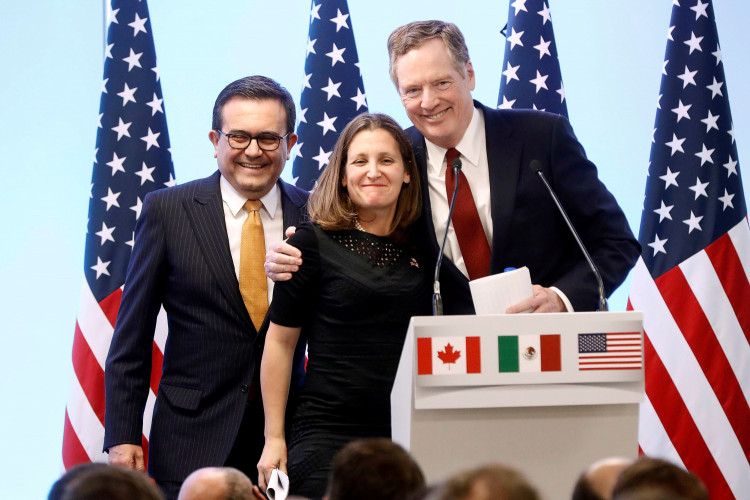The United States, Canada, and Mexico have finally agreed on a new North American Free Trade Agreement following a year of negotiations and after a grueling week of contradicting statements from the Trump administration and Canadian Prime Minister Justin Trudeau.
At some point, U.S. and Canadian officials have exchanged barbs against each other. One side said the United States is more than inclined to continue the deal without Canada. The other side said Canada would not bow down to pressures of looming Sept. 30 deadline.
In a joint statement released on Sept. 30, U.S. Trade Representative Robert Lighthizer and Canadian Foreign Affairs Minister Chrystia Freeland announced that their respective countries reached an agreement on what is touted as the modernized version of NAFTA.
The new agreement will be known in the 21st century as the United States-Mexico-Canada Agreement or USMCA.
Lighthizer and Freeland said USMCA will allow a more open market, fairer trade, and significant economic push for the three North American countries and the nearly half billion people who reside in the region. The deal will be beneficial for the countries' farmers, ranchers, and business owners. It will give power to the middle class as they will have access to good-paying jobs and new opportunities.
Specifically, the new trade deal will see enhanced rules of origin for automobiles, trucks, and other products with regard to currency manipulation. The agriculture sector in the region will also enjoy modernization with both food and agriculture trade.
The USMCA shall also ensure new protections on U.S. intellectual property rights.
There will also be new chapters covering Digital Trade, Anticorruption, and Good Regulatory Practices and a whole new chapter solely dedicated to rules governing the Small and Medium Sized Enterprises.
The final version of the USCMA is expected to be signed by all concerned parties before the end of November. The next step is to seek approval from the U.S. Congress.
Reuters reported that the new rules preserved the rights of U.S. President Donald Trump to impose 25 percent tariffs on automotive exported to the United States. If Trump proceeds with the said tariffs, Mexico and Canada would have a ceiling number of cars that will be exempted to these tariffs. Specifically, Mexico and Canada would each have 2.6 million passenger cars that will be exempted from the 25 percent tariffs while all pickup trucks will be entirely excluded from the levies.
Aside from passenger cars and pickup trucks, a total of $108 billion Mexican auto parts exported to the United States will be exempted from the taxes yearly. Canadian auto parts amounting to $32.4 billion will also be excused from tariffs yearly in the event that President Trump imposed 25 percent additional duties on car parts exported to his country.






